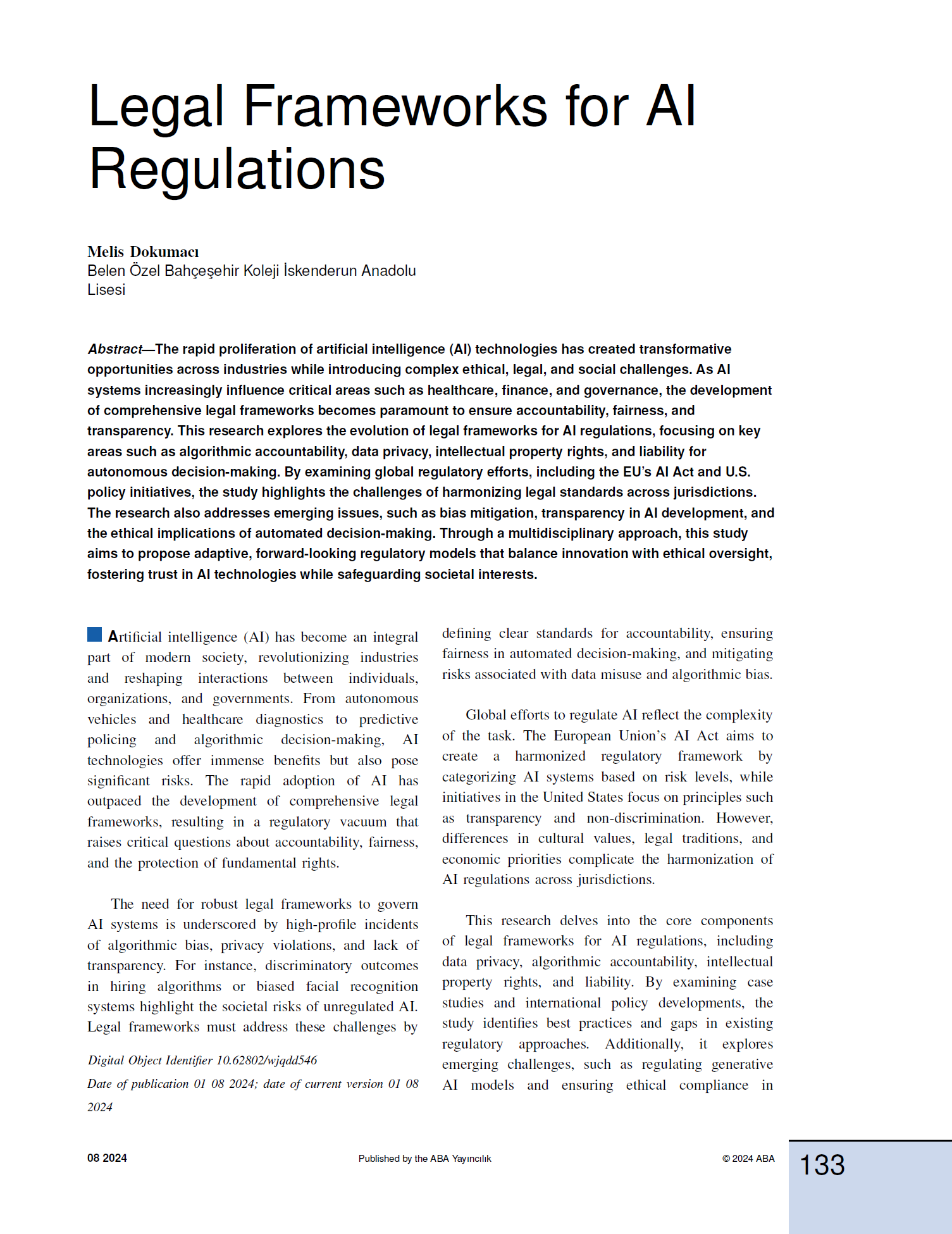Legal Frameworks for AI Regulations
DOI:
https://doi.org/10.62802/ytst2927Keywords:
AI regulations, legal frameworks, accountability, data privacy, algorithmic bias, transparency, intellectual property, liability, global regulatory standards, ethical AIAbstract
The rapid proliferation of artificial intelligence (AI) technologies has created transformative opportunities across industries while introducing complex ethical, legal, and social challenges. As AI systems increasingly influence critical areas such as healthcare, finance, and governance, the development of comprehensive legal frameworks becomes paramount to ensure accountability, fairness, and transparency. This research explores the evolution of legal frameworks for AI regulations, focusing on key areas such as algorithmic accountability, data privacy, intellectual property rights, and liability for autonomous decision-making. By examining global regulatory efforts, including the EU’s AI Act and U.S. policy initiatives, the study highlights the challenges of harmonizing legal standards across jurisdictions. The research also addresses emerging issues, such as bias mitigation, transparency in AI development, and the ethical implications of automated decision-making. Through a multidisciplinary approach, this study aims to propose adaptive, forward-looking regulatory models that balance innovation with ethical oversight, fostering trust in AI technologies while safeguarding societal interests.
References
Adelakun, B. O., Nembe, J. K., Oguejiofor, B. B., Akpuokwe, C. U., & Bakare, S. S. (2024). Legal frameworks and tax compliance in the digital economy: a finance perspective. Engineering Science & Technology Journal, 5(3), 844-853.
Akpuokwe, C. U., Adeniyi, A. O., & Bakare, S. S. (2024). Legal challenges of artificial intelligence and robotics: a comprehensive review. Computer Science & IT Research Journal, 5(3), 544-561.
Chinthapatla, Y. (2024). Safeguarding the Future: Nurturing Safe, Secure, and Trustworthy Artificial Intelligence Ecosystems and the Role of Legal Frameworks. International Journal of Scientific Research in Science Engineering and Technology.
Hacker, P. (2024). Sustainable AI regulation. Common Market Law Review, 61(2).
Igbinenikaro, E., & Adewusi, A. O. (2024). Navigating the legal complexities of artificial intelligence in global trade agreements. International Journal of Applied Research in Social Sciences, 6(4), 488-505.
Mensah, G. B., Nyante, F., Addy, A., & Frimpong, P. O. (2024). The Legal, Ethical, and Regulatory Implications of Integrating Artificial Intelligence in Healthcare Delivery, Medical Negligence, and Public Health Administration in Ghana: A Multidisciplinary Perspective. Africa Journal For Regulatory Affairs (AJFRA), 1-13.
Oduro, P., Uzougbo, N. S., & Ugwu, M. C. (2024). Renewable energy expansion: Legal strategies for overcoming regulatory barriers and promoting innovation. International Journal of Applied Research in Social Sciences, 6(5), 927-944.
Palaniappan, K., Lin, E. Y. T., & Vogel, S. (2024, February). Global regulatory frameworks for the use of artificial intelligence (AI) in the healthcare services sector. In Healthcare (Vol. 12, No. 5, p. 562). MDPI.
Uzougbo, N. S., Ikegwu, C. G., & Adewusi, A. O. (2024). Legal accountability and ethical considerations of AI in financial services. GSC Advanced Research and Reviews, 19(2), 130-142.
Zaidan, E., & Ibrahim, I. A. (2024). AI governance in a complex and rapidly changing regulatory landscape: A Global perspective. Humanities and Social Sciences Communications, 11(1), 1-18.


